
James Edwin Campbell was an American educator, school administrator, newspaper editor, poet, and essayist. Campbell was the first principal of the West Virginia Colored Institute from 1892 until 1894, and is considered by the university as its first president.

Margaret Murray Washington was an American educator who was the principal of Tuskegee Normal and Industrial Institute, which later became Tuskegee University. She also led women’s clubs. She was the third wife of Booker T. Washington. She was inducted into the Alabama Women's Hall of Fame in 1972.
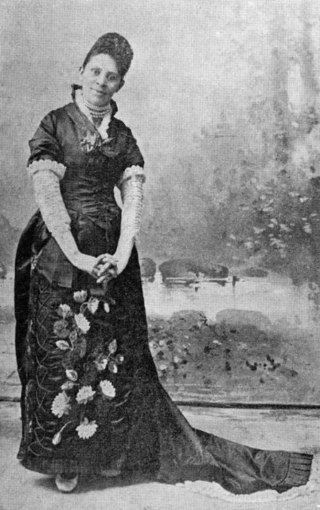
Hallie Quinn Brown was an American educator, writer and activist. Originally of Pittsburgh, Pennsylvania, she moved with her parents while quite young to a farm near Chatham, Canada, in 1864 and then to Ohio in 1870. In 1868, she began a course of study in Wilberforce University, Ohio, from which she graduated in 1873 with the degree of Bachelor of Science.

Ariel Serena Hedges Bowen was an African-American writer, temperance activist, and professor of music at Clark University in Atlanta in the late 19th and early 20th centuries. Twentieth Century Negro Literature (1902) noted that "she is regarded as one of the foremost and best cultured women of her race." She was a life member of the Woman's Foreign Missionary Society of the Methodist Episcopal Church.

Ethel Ernestine Harper was an African-American educator and performer. She was known for her portrayal of the Aunt Jemima advertising character during the 1950s.
An Alabama's Colored Women's Club refers to any member of the Alabama Federation of Colored Women's Club, including the "Ten Times One is Ten Club", the Tuskegee Women's Club, and the Anna M. Duncan Club of Montgomery. These earliest clubs united and created the Alabama Federation of Colored Women's Club in 1899. By 1904, there were more than 26 clubs throughout Alabama. The most active ones were in Birmingham, Selma, Mobile, Tuskegee, Tuscaloosa, Eufaula, Greensboro, and Mt. Megis.
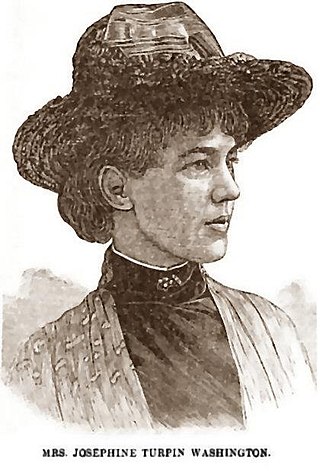
Josephine Turpin Washington was an African-American writer and teacher. A long-time educator and a frequent contributor, Washington devised articles to magazines and newspapers typically concerning some aspect of racism in America. Washington was a great-granddaughter of Mary Jefferson Turpin, a paternal aunt of Thomas Jefferson.

Josephine Silone Yates was an American professor, writer, public speaker, and activist. She trained in chemistry and became one of the first black professors hired at Lincoln University in Jefferson City, Missouri. Upon her promotion, she became the first black woman to head a college science department. She may have been the first black woman to hold a full professorship at any U.S. college or university.
Jessie Parkhurst Guzman was a writer, archivist, historian, educator, and college administrator, primarily at the Tuskegee Institute in Tuskegee, Alabama. In her work at the Tuskegee Institute, particularly in the Department of Research and Records, she documented the lives of African Americans and maintained the Institute's lynching records.

Bess Bolden Walcott (1886-1988) was an American educator, librarian, museum curator and activist who helped establish the historical significance of the Tuskegee University. Recruited by Booker T. Washington to help him coordinate his library and teach science, she remained at the institute until 1962, but continued her service into the 1970s. Throughout her fifty-four year career at Tuskegee, she organized Washington's library, taught science and English at the institute, served as founder and editor of two of the major campus publications, directed public relations, established the Red Cross chapter, curated the George Washington Carver collection and museum and assisted in Tuskegee being placed on the National Register of Historic Places.

Rosa L. Dixon Bowser was an American educator. She was the first black teacher hired in Richmond, Virginia. She organized the Virginia Teachers' Reading Circle, which became the Virginia State Teachers Association, the first organization representing black teachers in Virginia, serving as the organization's president from 1890 to 1892. Bowser was president of the Woman's Christian Temperance Union in Virginia, as well as founder and first president of the Richmond Woman's League. She was a correspondent for the magazine The Woman's Era, and wrote essays for national publications.

Georgia Mabel DeBaptiste (1867–1951) was an African-American journalist, teacher and social worker from Chicago. After completing her education, she taught at various notable black schools before becoming the first woman of African descent to be employed at the Chicago Post Office.

Adella Hunt Logan was an African-American writer, educator, administrator and suffragist. Born during the Civil War, she earned her teaching credentials at Atlanta University, an historically black college founded by the American Missionary Association. She became a teacher at the Tuskegee Institute and became an activist for education and suffrage for women of color. As part of her advocacy, she published articles in some of the most noted black periodicals of her time.
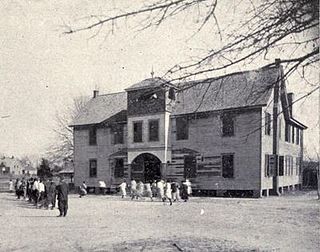
The Mount Meigs Colored Institute was a reform school founded by Cornelia Bowen for African-Americans in Mount Meigs, Alabama, an unincorporated community in Montgomery County, Alabama.
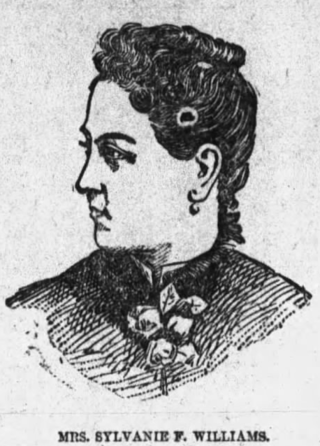
Sylvanie Francoz Williams was an American educator and clubwoman based in New Orleans, Louisiana, USA.
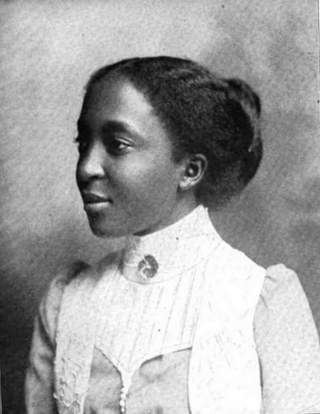
Lena Terrell Jackson was an American educator. She taught Latin to African-American students in Nashville, Tennessee for over fifty years.

Marie Louise Clay Clinton was an American educator, singer, and church leader, founder and superintendent of the Buds of Promise Juvenile Mission Society, under the Women's Home and Overseas Missionary Society (WH&OMS) of the African Methodist Episcopal Zion Church.
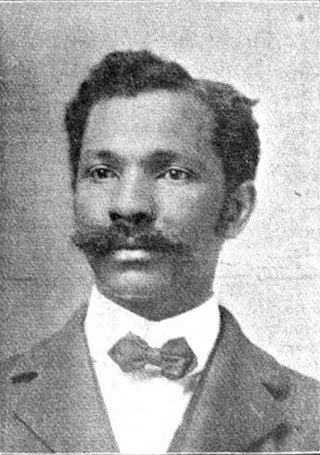
James Munroe Canty was an American educator, school administrator, and businessperson. Canty was an acting principal of the West Virginia Colored Institute in 1898 and is considered by West Virginia State as an acting president. Canty also served as the superintendent of Mechanical Industries for West Virginia Colored Institute from 1893 through 1914.

Vera Chandler Foster was an American social worker. She worked for the United States Veterans Administration in Tuskegee, Alabama, and served on the national boards of the YWCA, Planned Parenthood, and Common Cause.




















